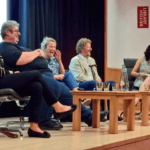Gillian Slovo on writing Ten Days
Ten Days is my thirteenth novel and, although it is in some ways a new departure for me, it is also a return to my beginnings as a novelist.
When I started out I wrote crime – five books featuring my detective Kate Baier who walked the mean streets of Hackney, which is where I lived at the time. Kate wasn’t me but we were both of the same age and both incomers to Britain, although while I hailed from South Africa, she was Portuguese. What we also had in common was a nosiness about what people get up to and what they are really thinking which, I grew to understand, was a requirement of both a detective and a novelist.
I cut my writing teeth on Kate. I will always be grateful to her because she taught me how to shape a story and how to drive a plot forward. But there came a time when the relentless pace of crime began to feel like a straightjacket. I wanted to write in other landscapes and other worlds. So I left Kate and turned my mind to a series of books, some of them set in South Africa (my going home, in a manner of speaking, to the place that I had been forced to leave) before branching out into times of war in Leningrad or Sudan or family strife in Sri Lanka.
And then a few years ago, I decided to turn my writer’s imagination on contemporary Britain, a place where so many different people live so close to each other in the major cities while leading completely different lives. My aim was to explore a concern that runs through my fiction – the way that politics affect the everyday – and to do it in a city. Thus was born the idea for Ten Days. I took inspiration from a previous project, where I had done a verbatim play (all the words came from interviews I did) on the 2011 riot, which had been put on in Kilburn’s Tricycle theatre as well as at the Bernie Grant Arts Centre. In doing the play, I had understood a lot about what drives a riot and understood the reasons they erupt as well as different responses to them. So for Ten Days I made up my borough – Rockham – and an inciting incident – the death of a man by police hand – which triggers my riot and sets not only the community but also the politicians and police on their different trajectories. And then I paid homage to my first literary heroine Kate by using what she had taught me about the forward push of a plot and bending it to this thriller where, in ten days, my three main protagonists – one local woman, one senior police officer and one major politician – find their lives turned upside down.


